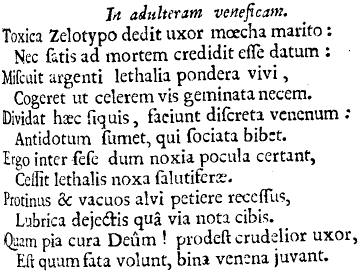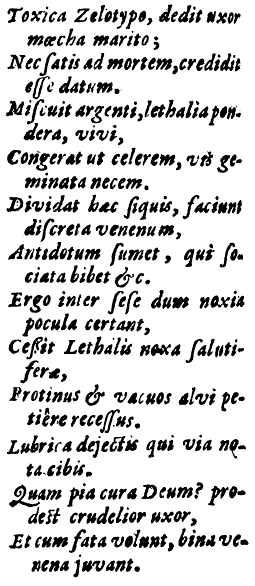Eumpina translata
I came across this poem by Ausonius while hunting through a 1674 Anthologia Latina for a pseudo-Vergilian epigram on the Pythagorean Y—it turned out to be absent from this edition, though I eventually found it. Still, this silly little fable was a good discovery, I think. I'm going to give you my translation of it at the end of this post—if you're not interested in all the preparatory material, feel free to skip it.

Ausonius (310-395) was from Bordeaux—he wrote much of local interest, such as poems about the Moselle, and about the local grammarians. His verse, like much verse of his century, was rather baroque, and a bit odd. For instance, one of his poems ends every line on a monosyllable—a somewhat Oulipian feat in Latin. In another of his works, he stitches Vergilian hemistichs into a naughty epithalamion—Raminagrobis translates a bit of it here. (This bizarre technique, known as the cento, was popular in the fourth century; Faltonia produced a Life of Christ by the same method, turning the Golden Bough into the Tree of Knowledge.) Anyway, the present epigram (no. 10) is more straightforward; it has been labelled above 'On the poison-crafting adulteress', but elsewhere 'On the adulteress Eumpina', or for Scaliger 'Eunapia', and it is about a cuckolding wife who poisons her husband. The Latin text:
The poem seems to have been popular during the Renaissance. Henry Peacham included it in his 1638 Valley of Varietie to illustrate the argument that every cloud has [thanks to God] a silver lining:
 Thus, he concludes, 'one poison expels and prevailes against another'. Peacham's text, we note, is slightly different. Leaving aside the ligatured cessit, and the rewired punctuation (especially in the penultimate line), he 1. substitutes congerat for cogeret—the two words mean much the same—2. et for est, and 3. cum for quam. The modern recension, incidentally, from which I translate, prefers the Anthology's cogeret and Peacham's et and cum. In addition to Peacham, Robert Burton (Anatomy, 3.3.4.1) cites the epigram for its (supposed) moral, and Dryden cites it in defence of a plot-device. We should hardly be surprised, therefore, that it was translated in this most Ausonian of centuries, by the Cavalier poet Richard Lovelace. Here's his version:
Thus, he concludes, 'one poison expels and prevailes against another'. Peacham's text, we note, is slightly different. Leaving aside the ligatured cessit, and the rewired punctuation (especially in the penultimate line), he 1. substitutes congerat for cogeret—the two words mean much the same—2. et for est, and 3. cum for quam. The modern recension, incidentally, from which I translate, prefers the Anthology's cogeret and Peacham's et and cum. In addition to Peacham, Robert Burton (Anatomy, 3.3.4.1) cites the epigram for its (supposed) moral, and Dryden cites it in defence of a plot-device. We should hardly be surprised, therefore, that it was translated in this most Ausonian of centuries, by the Cavalier poet Richard Lovelace. Here's his version:

Ausonius (310-395) was from Bordeaux—he wrote much of local interest, such as poems about the Moselle, and about the local grammarians. His verse, like much verse of his century, was rather baroque, and a bit odd. For instance, one of his poems ends every line on a monosyllable—a somewhat Oulipian feat in Latin. In another of his works, he stitches Vergilian hemistichs into a naughty epithalamion—Raminagrobis translates a bit of it here. (This bizarre technique, known as the cento, was popular in the fourth century; Faltonia produced a Life of Christ by the same method, turning the Golden Bough into the Tree of Knowledge.) Anyway, the present epigram (no. 10) is more straightforward; it has been labelled above 'On the poison-crafting adulteress', but elsewhere 'On the adulteress Eumpina', or for Scaliger 'Eunapia', and it is about a cuckolding wife who poisons her husband. The Latin text:
Toxica Zelotypo dedit uxor moecha marito:The poem actually functions as a syllogism in Barbara: the minor premise is given first—the wife poisons her husband twice—then the major premise, which is that two poisons always neutralise each other—then the conclusion, marked by the word ergo. Some difficulties with the Latin: that irritating Vergilian petiere for petierunt, which always throws me, and the genitive plural Deorum contracted as Deum. The spelling lethalis is not classical, and should be letalis. There are some nice plays, however; for instance, the mercury or 'living silver' (to give the true meaning of 'quick' in quicksilver) turns out to be that which brings life, and the lethal division of the two substances seems to mirror the social division of the married couple. I haven't read a German translation of this poem, but they have the excellent opportunity to play on datum, as Gift in their language means 'poison'.
Nec satis ad mortem credidit esse datum:
Miscuit argenti lethalia pondera vivi,
Cogeret ut celerem vis geminata necem.
Dividat haec siquis, faciunt discreta venenum:
Antidotum sumet, qui sociata bibet.
Ergo inter sese dum noxia pocula certant,
Cessit lethalis noxa salutiferae.
Protinus & vacuos alvi petiere recessus,
Lubrica dejectis qua via nota cibis.
Quam pia cura Deum! prodest crudelior uxor,
Est quam fata volunt, bina venena juvant.
The poem seems to have been popular during the Renaissance. Henry Peacham included it in his 1638 Valley of Varietie to illustrate the argument that every cloud has [thanks to God] a silver lining:
 Thus, he concludes, 'one poison expels and prevailes against another'. Peacham's text, we note, is slightly different. Leaving aside the ligatured cessit, and the rewired punctuation (especially in the penultimate line), he 1. substitutes congerat for cogeret—the two words mean much the same—2. et for est, and 3. cum for quam. The modern recension, incidentally, from which I translate, prefers the Anthology's cogeret and Peacham's et and cum. In addition to Peacham, Robert Burton (Anatomy, 3.3.4.1) cites the epigram for its (supposed) moral, and Dryden cites it in defence of a plot-device. We should hardly be surprised, therefore, that it was translated in this most Ausonian of centuries, by the Cavalier poet Richard Lovelace. Here's his version:
Thus, he concludes, 'one poison expels and prevailes against another'. Peacham's text, we note, is slightly different. Leaving aside the ligatured cessit, and the rewired punctuation (especially in the penultimate line), he 1. substitutes congerat for cogeret—the two words mean much the same—2. et for est, and 3. cum for quam. The modern recension, incidentally, from which I translate, prefers the Anthology's cogeret and Peacham's et and cum. In addition to Peacham, Robert Burton (Anatomy, 3.3.4.1) cites the epigram for its (supposed) moral, and Dryden cites it in defence of a plot-device. We should hardly be surprised, therefore, that it was translated in this most Ausonian of centuries, by the Cavalier poet Richard Lovelace. Here's his version: Her jealous husband an adultresse gaveLovelace omits lines 5-6 here; otherwise the rendering is pretty literal, and in fact quite good, although the penultimate line is a bit weak. So, you want my attempt? Well, here goes:
Cold poysons, too weak she thought for's grave;
A fatal dose of quicksilver then she
Mingles to hast his double destinie;
Now whilst within themselves they are at strife,
The deadly potion yields to that of life,
And straight from th' hollow stomack both retreat
To th' slippery pipes known to digested meat.
Strange care o' th' gods the murth'resse doth avail!
So, when fates please, ev'n double poysons heal.
A wife, promiscuous, gives her spouse—the jealous type—
a venom she later fears not strong enough to kill.
Then she ponders, and mixes quicksilver, so lively
lethal, as one to quicken death, to dumb him, and to still.
While separate, each potion as poison keeps its oath—
he has himself an antidote, a cure, who drinks them both.
And ergo, as the noxious pottles wrestle in his gut,
the lethal turns salubrious, the venom is outshut,
and both are valved and voided, from his bowels receding
to those lubricious chutes well-worn with well-digested feeding.
How mindful the gods, that make boon of so cruel a wife—
since the fates intend that venoms, twinned, comprise not death, but life.



2 comments:
I really must get around to reading some more Ausonius.
Funny that you should mention Pseudo-Virgil De littera Y: I was just looking at that last week (Josse Bade has a commentary on it in his 1492 Sylvae morales) - the first time I'd ever heard of it.
The name is only distantly familiar to me. Does Bade discuss the Golden Bough? If so, again, please do get in touch.
Post a Comment